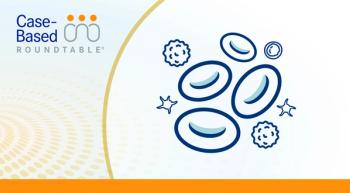
MDS: Transfusion Independence Across Different Risk Subgroups in IMerge Phase 3 Trial
Expert perspectives on 2 abstracts presented at ASH 2023 looking at durable continuous transfusion independence and efficacy across different risk subgroups in the IMerge phase 3 trial in MDS.
Episodes in this series

This is a video synopsis of a discussion featuring Gary J. Schiller, MD, chief of the Hematological Malignancy/Stem Cell Transplantation program at the David Geffen School of Medicine at UCLA Health Jonsson Comprehensive Cancer Center.
Uwe Platzbecker, MD, PhD, and colleagues presented data on the imetelstat IMerge study, a global double-blind randomized placebo-controlled phase 3 trial in patients with transfusion-dependent, erythropoiesis-stimulating agent (ESA) refractory or resistant myelodysplastic syndromes (MDS). Patients did not have deletion 5q and were generally naive to hypomethylating agents (HMAs). In the imetelstat group (n=118), 17.8% achieved greater than 1 year sustained transfusion independence and 45% had greater than 8-week transfusion independence.
Dr. Platzbecker stated that imetelstat is a telomerase inhibitor, a phosphorothioate oligonucleotide that targets cells with high telomerase activity, potentially inducing apoptosis of neoplastic clones. It was previously shown in phase 1 trials to have favorable effects on transfusion dependence, improvement in hemoglobin, and decreasing inflammation.
In the IMerge trial, median prior 8-week transfusion burden was 6 units for the imetelstat group and 5 units for the placebo group. Baseline characteristics represented typical low risk MDS. Authors presented mutational data showing all patients had SF3B1 mutations at baseline with concurrent TET2, DNMT3, ASXL1 or JAK2 mutations, again typical for this patient population.
In summary, treatment with imetelstat resulted in greater than 1 year sustained transfusion independence for nearly 18% of patients who were ESA refractory or relapsed with high transfusion burden, significantly better than placebo where no patients sustained response. This offers hope for patients with transfusion-dependent MDS resistant to ESAs.
In a follow up analysis, Komrokji et al. looked at efficacy of imetelstat in achieving red blood cell transfusion independence in low-risk MDS subgroups from the same IMerge study population. Subjects were red blood cell transfusion-dependent, non-deletion 5q low risk MDS previously exposed to ESAs. Imetelstat efficacy differed among MDS subgroups. Notably, no transfusion independence was achieved in higher risk groups on placebo whereas a response was seen with imetelstat. In lower risk groups, 42% achieved transfusion independence with imetelstat versus 19% on placebo.
*Video synopsis is AI-generated and reviewed by Targeted Oncology editorial staff.










































